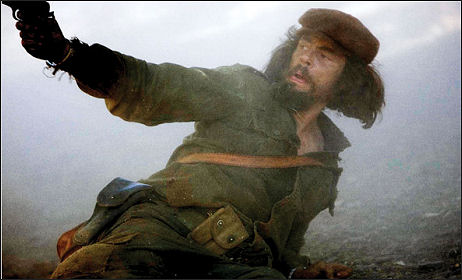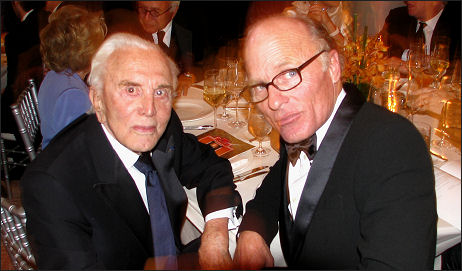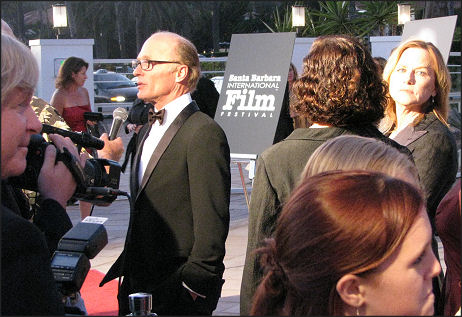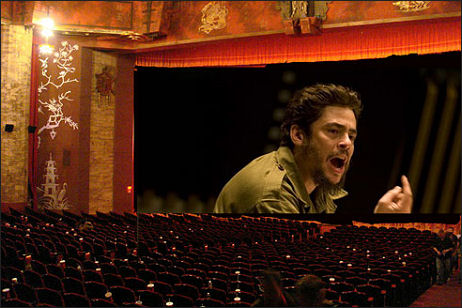Day: October 3, 2008
Who’s Toast, and How Did It Happen?
Which venerated directors who made their bones in the ’70s and ’80s have more or less become dead meat in terms of landing hired-gun film gigs or getting their pet projects financed?
To hear it from Variety‘s Anne Thompson, five victims of this MIA syndrome are Lawrence Kasdan (Grand Canyon), Joe Dante (Gremlins), Phil Kaufman (The Right Stuff), Jim McBride (The Big Easy) and Robert Towne (Pre, Personal Best).
The above-named directors were “once reliable makers of modest studio hits, enjoying both popular and critical success,” Thompson notes. “But they’re rarely tapped for new film projects. And they often hit a brick wall in trying to mount their own passion projects.”
Wells to HE Readers: which other former toast-of-the-town directors have been put out to pasture (or have decided it’s better to opt out than be put out)?
“The heart of the problem is Hollywood’s ‘What have you done for me lately?’ mindset,” Thompson writes. “If more than one studio decides that a filmmaker is too old, expensive, difficult, uncommercial or irrelevant, it becomes harder and harder to get a job. The offers stop coming.
“Part of the problem is that studios — and their specialty divisions — prefer close, cordial relationships with cooperative helmers. Final cut is an issue. Name someone who may not be hip, commercially minded or tuned into younger viewers, and execs’ eyes glaze over.
“Many directors try to assemble indie passion projects on the assumption that they’d better love something if they’re not going to get paid. But when faced with the harsh reality of the numbers on the indie side, they balk.
“‘Are they willing to financially or deal-wise start over?’ asks Picturehouse’s Bob Berney. ‘It’s also hard to connect with the people who will let you do it.’
“Many studio directors are marooned within Hollywood’s powerful class snobbery about working in television or cable or Indiewood.
“When they aren’t being paid top dollar for scripts-for-hire, Towne and Kasdan are pitching arcane movies that nobody, studio or independent, wants to make.
“One director’s agent suggests that career rehab requires acting like a young director again: ‘You can’t sit on your high horse and make a movie. Everybody’s got to be entrepreneurial.'”
Carol Opening
The first ten minutes of David “Fredo” Zucker‘s An American Carol (opening today, not screened for critics) is viewable on the Moviefone site.
I’m a little embarassed to admit this, but I laughed three times at the Jack Benny-level Middle Eastern ethnic humor, even if the point is that (I’m going to use an appropriately crude term that fits the level of humor) terrorist towelheads are doofuses.
And while his performance may wear thin over 90 minutes, Robert Davi‘s terrorist is moderately funny — it may be the most enjoyable thing I’ve ever seen him do in a film. But when Davi calls out “Hussein!” and ten turbaned guys jump out behind rocks, are we supposed to think that Zucker didn’t throw this in as a dig at Barack Obama? It’s hard to believe he isn’t.
Here’s Frank Scheck‘s Hollywood Reporter review, out tdoay. The headline reads, “Proves once and for all that Democrats are simply funnier.”
“Ocean’s 11 With Better Cigars”?
It’s my sad duty to report that N.Y. Times critic Manohla Dargis, always a thoughtful and delicious read, has more or less sided with the “where’s the beef?” critics of Steven Soderbergh‘s Che.

“Divided into two sections — once called The Argentine and Guerrilla — the now monosyllabically titled Che tracks the guerrilla leader over mountains and through his tactical successes in Cuba before moving on to his catastrophic bid to bring revolutionary socialism to Bolivia,” she writes. “The movie has been described as dialectical, but two parts do not a dialectic make: something meaningful has to happen between those parts.”
I’m shaking my head as we speak. “Something meaningful” does happen in Soderbergh’s film. It’s just that it’s spread evenly over the 257-minute length. The fact that it’s not ladled out in carefully shaped and timed payoffs (generally referred to as dramatic highpoints or “movie moments”) is what constitutes, for me, the profound plain-deal dignity of it.
The “something” that Manohla can’t see for the trees is that you’re genuinely, atmospherically there with Benicio del Toro’s Che Guevara and his scrappy jungle rats through all manner of thick and thin. The music in Soderbergh’s film is mostly low-key, but it builds into a symphony of often breathtaking realism that sinks in deeper and deeper the more you reflect upon it.
Fug it — I’m going to see Che again (for the third time) at the Saturday, 11.1.08 screening at the big Mann’s Chinese theatre (the one that’s been there since the 1920s) in Hollywood. And I’m buying the DVD.
“Throughout the movie Mr. Soderbergh mixes the wild beauty of his landscapes with images of Che heroically engaged in battle, thoughtfully scribbling and reading, and tending to ailing peasants and soldiers,” Dargis observes. “Che wins, Che loses, but Che remains the same in what plays like a procedural about a charismatic leader, impossible missions and the pleasures of work and camaraderie — Ocean’s Eleven with better cigars.
I love this part of her review, though:
“Like that glossy, glistening bauble of a film, Che seems to me very much a self-reflexive endeavor, a movie not just about two revolutionary campaigns, but also about the struggles — logistical, emotional, psychological — of moviemaking itself. (To push this analogy further, Mr. Soderbergh’s first feature, sex, lies, and videotape, is his Cuba — an act of youthful will and the spark that ignited a movement — while his second feature, a stubborn folly called Kafka, could have been his Bolivia.)
“Mr. Soderbergh cagily evades Che’s ugly side, notably his increasing commitment to violence and seemingly endless war, but the movie is without question political — even if it emphasizes romantic adventure over realpolitik — because, like all films, it is predicated on getting, spending and making money.”
Way Back When
At a recent New York Film Festival Changeling press conference, director Clint Eastwood announced that he’s not on the team for Obama or McCain, despite a general understanding that he’s always been a right-of-center type of guy. Which he is, except in a Libertarian vein. (I’ve never felt negatively toward Libertarians — I’ve always respected where they’re coming from.)
Eastwood said that first political alignment, which happened in the early ’50s, was to become an “Eisenhower Republican.” Clint used the exact same term with me during a Bridges of Madison County phoner we did in ’95.
Fair and Honest
The two funniest things in this Fox News video report are (a) the white-haired wife in the rear pushing her husband’s hand down when the reporter says “who’s for McCain?” and (b) the sound of people in the room (mostly 65-plus) chortling when the reporter says the vote is generally split with a little bit of a lean for Obama.
“Contrived Phoney Baloney”
Corrected: Given Thursday morning’s thumbs-up capsule review from a friend of Ridley Scott‘s Body of Lies, this slam review by Variety‘s Todd McCarthy came as a bit of a shock.
“Neither the location-based verisimilitude of Ridley Scott‘s shooting style nor the estimable Middle East expertise of source-material author David Ignatius can disguise Body of Lies as anything other than the contrived phony-baloney it is. Coming on like an inside account of CIA operations against jihad-minded terrorists, pic shows its true colors by featuring a shootout, chase or big explosion every 10 minutes or so, on its way to a climax so conventional it would have been at home in a 1940s Warner Bros. melodrama.”
I read McCarthy’s review on my iPhone while getting gas on the way up to Santa Barbara. I literally said “whoa” out loud while reading the first graph.
The Hollywood Reporter‘s Kirk Honeycutt came in positive, although I wondered what he really meant when he wrote that the film “may not be as much fun as old spy movies starring Cary Grant” — North by Northwest? — “or more recent entertainments such as Spy Game, directed by Ridley’s brother Tony, but it feels all too accurate.” Or this statement: “To be sure, the film retains familiar genre elements…but how the action-thriller crowd will react to such a disturbing environment is a tough call.”
Biden’s Choke-Up Moment
Joe Biden won last night’s debate with a steadier presence and much more explicit and comprehensive explanations compared to what Sarah Palin had to say (although form-wise she handled herself half-decently). But he also made the strongest emotional impression with his story about taking care of two boys alone and essentially conveying his understanding of how life can hurt badly at times and what it’s like to struggle with a limited income. That was it, that was “the moment.”
Harris Tribute Dinner

Kirk Douglas, Ed Harris at last night’s Santa Barbara Film Festival tribute dinner (formally called the “third annual Kirk Douglas Award for Excellence in Film”) honoring Appaloosa director Ed Harris. Three tribute reels were shown; the first was the most moving and impressive. Harris has made 54 films since his breakout part in The Right Stuff 25 years ago, and for whatever reason — laziness? — I hadn’t really taken the full measure of all the distinctive muscular performances he’s given. Quite a resume, quite a man. The Pollock clips drew the strongest applause. My favorite Harris characters — Moss in Glengarry Glen Ross, E.Howard Hunt in Nixon.




